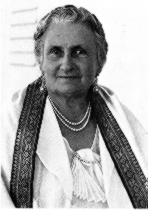
Philosophy

The Montessori method is a system of education that is both a philosophy of child development and a rationale
for guiding such growth. It is based on children’s developmental needs for freedom within limits, as well as,
a carefully prepared environment, which guarantees exposure to materials and experiences. It is designed to
take full advantage of children’s desire to learn and their unique abilities to develop their own capabilities.
The basic tenet of Montessori education is that a child learns best in an enriched, supportive environment
through exploration, discovery and creativity with the guidance and encouragement of a trained and caring staff.
...children are encouraged to
pursue
their interests, make responsible
choices for themselves and direct
themselves to constructive activities.
| At the turn of this century, Maria Montessori, an Italian physician, conceived and developed a system
of educating young children based on her observations and conclusions about how children learn. She
developed materials and methods based on her belief that education involved the unfolding and development
of the child's innate abilities, talents and interests. Her approach was scientific and humanistic. Her
ideas rapidly spread around the globe resulting in training programs and schools opening throughout the
world. Montessori schools have been in existence for 82 years in the United States. There are currently
over 3,000 independent and 130 public school systems using the Montessori method.
|
 |
The goals of Montessori education are to cultivate each child's natural desire to learn, acquire and master
skills, learn responsibility and cooperation and foster strong, positive feelings about oneself and others.
The method addresses the total child developing social skills, emotional growth, physical coordination, and
cognitive preparation, within a thoughtfully designed environment.
The classroom is prepared with a wealth of materials selected and designed to meet the needs of the
individuals it serves. There is a range of materials both in variety and level of development to allow
children to progress through the curriculum as their skills develop. Typical areas of a Montessori
Pre-school/Kindergarten classroom include: Everyday Living, Math, Language, Art, Sensorial, Music, Geography,
Science, Movement, Nature Study, Animal Care. At the Elementary level these basic areas are expanded to
include Biology, Botany, Zoology, Physical Sciences, History, Junior Great Books and Foreign Language.
Some of the characteristics that distinguish a Montessori program are:
Mixed Age Groupings
Called family groupings, the classes are composed of a 3 year age span for both elementary and pre-school
programs. Each class includes children ages 3-6, 6-9 or 9-12. This allows for peer teaching, broad social
interactions, individual differences in learning style and pace, and creates a social community of family.
It provides the youngest students with a graded series of role models and the older students with peer
teaching opportunities for reinforcement of learning.
Individualized Instruction
Each child learns and develops at her/his own pace through the use of materials and lessons
introduced by trained staff. The integrated curriculum is introduced sequentially and at the
developmental level of each individual child, allowing every child to work to capacity and at
their ability level.
Child Directed Program
Within the structure of the classroom and curriculum, children are encouraged to pursue their
interests, make responsible choices for themselves and direct themselves to constructive
activities. Since children's interests vary, this opportunity results in an independent,
self-motivated learner.
Designed Environment/Materials
The school environment is prepared with a variety of specially designed Montessori materials
- multi-sensory, sequential and self-correcting. Educational materials are carefully selected
to meet the needs of range of students in each class and to meet the goals of the program.
Specialized Staff
In addition to background and experience in early childhood education, teachers receive specialized
training in the Montessori method. Training programs throughout the world prepare and certify teachers
in the field. The course of study includes educational philosophy, academic training in the curricula
areas, early childhood development, classroom management, and use of materials for individual lessons.
Hands-on Approach To Learning
The use of materials for learning in the Montessori classroom is an integral part of the program
from pre-school through the elementary years. Based on a belief that children learn by doing,
lessons for math, language and all subject areas include hands-on materials for use by the student.
Integrated Curriculum
Especially at the elementary level, the curriculum integrates many subject areas into the lesson at
hand. This enables students to use their knowledge and skills in context and to see the "whole" picture.
Whole Language Approach To Reading
There is a concentration on writing and reading across the curriculum. Activities and lessons are
student generated according to ability and learning style. The literature programs meets the child's
individual needs.
In essence, the Montessori method looks to follow the child; to guide and nurture the learning process.
The basic philosophy, as stated by Maria Montessori herself... "never let a child risk failure until he
has a reasonable chance of success." ...sets the tone for a happy, productive school day for the
children attending.
|

